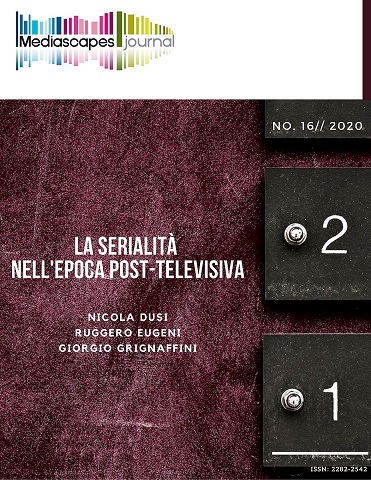Tv playlist: serie tv, musica e supervisione musicale
Parole chiave:
music supervisor, tv series, compilation score, television, songsAbstract
The essay focuses - within a semiotic methodological setting - on the role of music within the TV series in recent years, starting with a comparing with Seventies. That television sound universe - including commercials - constituted a sort of world apart with respect to the music heard on the radio in that same period. An historical disjunction between music and television which seems to change coinciding with the mid-eighties. In this regard the innovative example of the Miami Vice series is here mentioned, and a crucial role seems having been played also by the advent of music videos and the MTV network. An influence felt both in television and in cinema, with a new relevance acquired by compilation scores, that is, only composed of pop songs (think of the Q. Tarantino case), or in any case of non-original compositions. A significantly different role of music in the TV series appeared with the "The OC" case: a series where music was not meant to have only an underscore function but it should have being an essential element of the storytelling process. The choice of Alexandra Patsavas as musical supervisor marked a change in the relevance of this productive role. Usually music supervisor has the task of finding the suitable songs to compose the soundtrack of an audiovisual. A role involving taste and legal skills, but which in recent years is also crucial in the creation of television storytelling. For this purpose, a case analysis of some sequences of the "Better Call Saul" series is proposed here. In addition, some examples of contemporary use of music in the TV series are treated, relating for instance to the use of diegetic music (music belonging to the fictional world of characters) and to the use of compilation scores coming from past soundtracks, as is the case of the "Homecoming" series.
##submission.downloads##
Pubblicato
Come citare
Fascicolo
Sezione
Licenza
Gli autori che pubblicano su questa rivista accettano le seguenti condizioni:
- Gli autori mantengono i diritti sulla loro opera e cedono alla rivista il diritto di prima pubblicazione dell'opera, contemporaneamente licenziata sotto una Licenza Creative Commons - Attribuzione che permette ad altri di condividere l'opera indicando la paternità intellettuale e la prima pubblicazione su questa rivista.
- Gli autori possono aderire ad altri accordi di licenza non esclusiva per la distribuzione della versione dell'opera pubblicata (es. depositarla in un archivio istituzionale o pubblicarla in una monografia), a patto di indicare che la prima pubblicazione è avvenuta su questa rivista.
- Gli autori possono diffondere la loro opera online (es. in repository istituzionali o nel loro sito web) prima e durante il processo di submission, poiché può portare a scambi produttivi e aumentare le citazioni dell'opera pubblicata (Vedi The Effect of Open Access).


